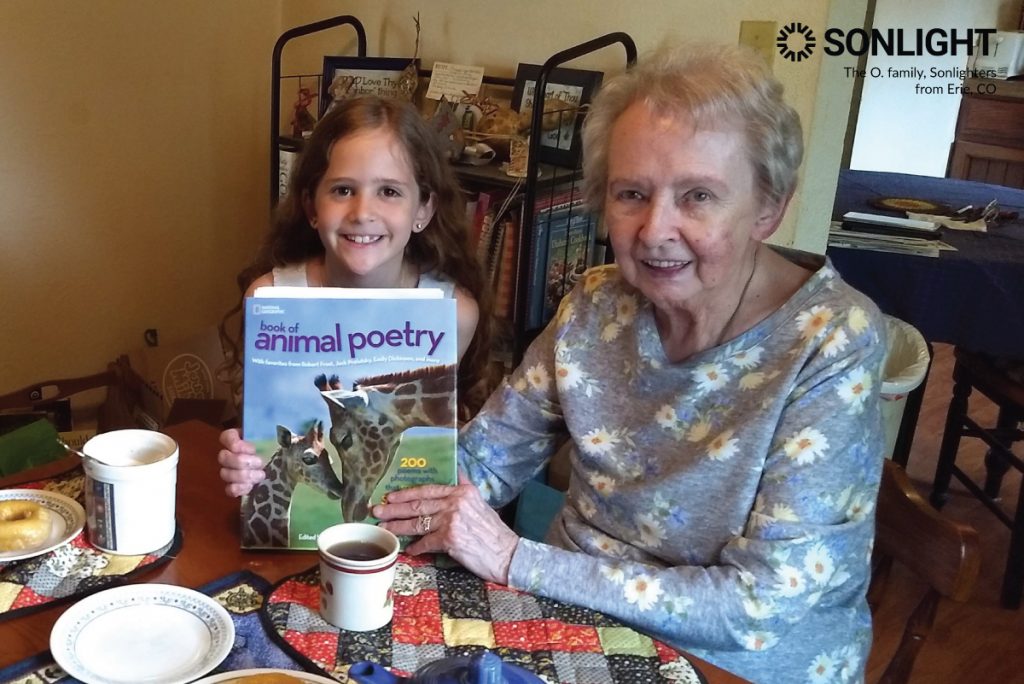Poetry can seem like a daunting type of literature to dive into. Discover all the ways poetry is a treat you can indulge in!

Poetry. Just uttering the word poetry may evoke dread and terror! Maybe you, along with many others, have secretly thought, “I don’t get poetry! What am I missing?”
Confession: There was a time when I didn’t know why anyone would want to get poetry until the day a college friend lovingly opened her handwritten poetry scrapbook collection. I politely listened as she read her favorites aloud to me. Many years later, I finally understand what possibly possessed my friend to take the time to handwrite her favorite poems.
Today reading poetry feels like an indulgent treat!
How Poetry Can Be a Treat
Poetry encourages a moment to stop, rest, and ponder amidst our busy daily lives. Poetry may express the poet's dreams, memories, hilarious and sometimes ironic events, imaginative whimsical ideas, and deep emotions and experiences. Reading poetry provides the opportunity to enjoy playing with words and sometimes even dance with language.
Poetry comes in all shapes and sizes! From the the short and structured haiku, to long poems covering many pages, to the beauty of Shakespeare’s sonnets, or to the wisdom of the Psalms, there is a poetic form for everyone!
Sometimes readers of poetry lose patience with a poet. Understanding poetry may be overwhelming because, in the brief format, each word counts. Yet reading poetry aloud and taking the time to consider the rich meaning and beauty of a poet’s work yields the reward of identifying with another person’s perspective and a deeper understanding of our own emotions and experiences.
Good news! Sonlight approaches poetry as poetry appreciation—learning to listen and hear various ways to combine words. Sonlight creates an opportunity to enjoy the beauty of words that will eventually spill over into appreciating other art forms. Sonlight includes poetry for every learning level but does not include discussion questions, allowing you and your child to play with words and consider writing and poetic form from an utterly creative place.
How to Help a Young Learner Enjoy Poetry
Sonlight begins the journey of the poetry with rhythm and rhyme through A Treasury of Mother Goose Rhymes in the early learning years. Mother Goose classic rhymes introduce the joy of playing with words.
Open the this anthology with a sparkle in your eye to indicate the fun and adventure of rhyme. Look at the illustration for each poem and discuss what is happening in the picture. Read the title aloud, then pause to talk about possible content.
Once you have piqued your child's interest, read the verse through entirely without stopping, so the rhythm of the words is clear. Discuss the content of the rhyme again. The discussion may be as simple as talking about the child’s favorite part. Next, reread the rhyme pausing to allow the child to fill in a rhyming word or words. Talk about the fun sounds of the rhyming words. Most children enjoy acting out a rhyme, and if they are hesitant, join the party and act out the poem together!
When a child enjoys a particular poem, you may want to integrate other arts. Sing-song the poem using a tune of your creation. Offer the chance to Illustrate the poem according to the child’s vision. There is no need to cover each idea for every rhyme. The goal is to help the child enjoy the rhymes through play incorporating suggested techniques as time allows.
It's been a joy to watch her learn to read, develop a love for poetry and be excited to share at dinner what she found most fascinating that day. Thank you, Sonlight.
The M Family, Sonlighters from Noblesville, IN
How to Help a Grade-School Child Enjoy Poetry
Sonlight offers an incredible variety of age-appropriate and interest-appropriate poetry books throughout the grade school years.
The Llama Who Had No Pajama offers silly fun, just right for the young grade-school child.
A Child’s Introduction to Poetry is intended for the enjoyment of the older grade-school child. Most of the poetry books include inviting artwork to accompany the poetry, enhancing the understanding and meaning of poems.
When working with a grade school child who can read the poetry themselves, read the poem aloud with the child to increase enjoyment and understanding. The poetry selections at grade school levels are loaded with figurative language, imagery, and often a cadence and rhythm to the words. Reading out loud increases the enjoyment of literary techniques like alliteration and onomatopoeia which tickle the ears when heard and not merely read silently.
If the poem’s topic seems unfamiliar to the child, you may want to provide background information to increase their understanding. Keep it simple. Perhaps a word is new to your child. Talk about the word and then reread the line together. Keep discussions brief and light so the focus remains on enjoying language together.
When a particular line or an entire poem impacts or amazes you, share your thoughts with your child. Let them know what struck you and guide them through your thinking. Just as children learn to speak through hearing speech around them, hearing poetry will help them develop their understanding and appreciation of it.
Sonlight's regular diet of quality books has given our daughter a growing love of poetry. She has also been inspired to write her own poems. We now have regular Poetry Tea Parties with a couple of other homeschooling families. What could be a better combination than poetry and cakes—food for the mind, body and soul!
The S Family, Sonlighters From London, UK
How to Help a High School Student Enjoy Poetry
Sonlight continues poetry exploration and appreciation throughout the middle and high school years with the works of poets like Whitman, Byron, Dickenson, Poe, and Shakespeare. Perrine’s, Sound and Sense, found in Level 630-British Literature provides an excellent resource for the junior or senior student who enjoys poetry and desires to dig deep into the study of it.
When working with the older student, increase the understanding and enjoyment of poetry by reading about the poet’s background, experiences and culture. Knowing the poet's perspective raises a connection with the meaning of the poet’s words. Often sophisticated poems contain biblical, mythical, or cultural allusions. Helping the student identify allusions and discussing how the allusion encapsulates the depth of meaning of the poem also grows understanding and appreciation.
If the poem centers around a historical event, you and your child should take the time to become familiar with the event. Consider assigning the memorization and recitation of a poem of the student’s choice. Poetry, like a play, is meant to be heard. I have listened to student recitations of Shakespeare’s sonnets, complete with gestures and British accents.
Sometimes, a student requests to memorize and recite a meaningful poem of their choosing. Absolutely! The goal is to inspire the student to appreciate and enjoy the art form of poetry.
Don't let poetry overwhelm you. Knowing when to utilize a particular suggestion develops over time. Some poems lend themselves to reveling in the moment or feeling that the poet expresses. Gift your child with reading a particularly visual poem aloud while they close their eyes and enjoy. Remember that you have invested time modeling how to approach a poem with your child, leading them and inspiring them to appreciate the poet's artistry on their own. Who knows? Maybe your child will create a handwritten collection of their favorite poems due to the rich, meaningful time they have spent enjoying poetry with you.
Sonlight books are wonderful! We come back to them again and again. Some books have been in our library for several years now, but as the kids get older, they can explore on deeper level, now memorizing poetry to share at our homeschool group. I love this journey we are on—Sonlight has made it easy to love learning!
The W Family, Sonlighters From Visalia, CA
Reading poetry gives us permission to stop our busyness and reflect to consider the small moments of our lives. Thornton Wilder best expressed the blessing and joy of appreciating small moments in our lives in Our Town.
Emily asks, “Do any human beings ever realize life while they live it? – every, every minute?”
The Stage Manager replies, “The saints and poets, maybe – they do some.”







